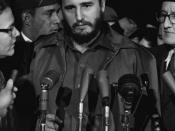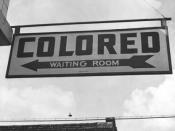"With the U.S. domination of Cuba, race discrimination, which should have been wiped out forever by the blood shed in common on the field of battle... became especially acute. In the parks of many cities one could observe the disgraceful sight of blacks and whites segregated in separate areas. Many educational, economic, cultural and recreational establishments were barred to black citizens, who were denied the right to study, work, and enjoy culture, and what is more important, human dignity."
What is said above by Fidel Castro in 1975 reflects the 19th century Cuban society. Though racism was a much worse issue in that time in the society, race still is a part of Cuban liberation and since then the imperialists have changed from Europeans to Americans. Ada Ferrer talks of the 30 year long Cuban struggle over the nature of their relationship to the Spanish colonials. This struggle against the Spaniards also reveals the conflicts and tensions within the Cuban independence movement which was necessary to overcome to assume unity and achieve victory.
The war was an unprecedented movement that unified the black, mulatto and white individuals who for 30 years carried on an implacable struggle for freedom and independence in the last stronghold of Spain's empire in Latin America. Despite of being an unrevolutionary society, Cubans fought their war of independence against the Spanish in the 19th century. Concept of a raceless nation was given rise during the war. The 1800s were a period of revolutionary battles, many of which began to raise the issue of race. It was also a time of massacres of the black population. The ten-year war that erupted in 1868 was begun by the act of freeing slaves, opening the way for a greater political role for blacks. The late 1880s also led to...


